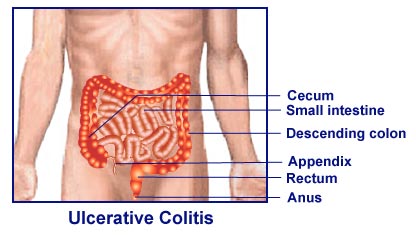About Ulcerative Colitis
Ulcerative colitis is a chronic inflammation of the large intestines. Symptoms of ulcerative colitis are repeated attacks of pain, diarrhea and bleeding from the rectum. The disease also has long periods of remission when a patient is free of attacks followed by relapse or recurrence. Though the disease does not have any age or sex predilection, it often tends to affect younger individuals.
This inflammatory bowel disease closely mimics another disease called Crohn#$#s disease that also falls under the same category and presents a similar picture of pain, bleeding from the rectum and loose stools.
Crohn’s disease and ulcerative colitis differ in that ulcerative colitis almost always involves only the large bowel whereas Crohn#$#s can occur in any part of the digestive tract.
Ulcerative colitis tends to run in families and was for some reason is not seen in Asians, Africans, South Americans and people from Eastern Europe. The incidence is higher in Whites and people of Jewish descent however increasing globalization is reducing this trend.

Ulcerative colitis affects less than 0.1% of the population and has an incidence of 35 to 1100 per 100,000 in the United States.
Though the cause is unknown, it is touted to be an immune-linked disorder; an attack, responds to steroids and immunosuppressant drugs. Like other diseases of immune origin, there is no cure for ulcerative colitis.
The severity of ulcerative colitis symptoms depends on the extent of involvement of the intestines, with limited involvement causing milder symptoms. Extensive involvement or pan colitis can give rise to repeated diarrhea, bleeding, and severe crampy pain, necessitating intense medical treatment. The chronic form of the disease gives the patient a wasted look. Malcolm B. Docherty, M.D, wrote about the chronic disease as follows -
"Oh give me carcinoma of the spine.
Or crazed from lues let my spirit fly;
But suffer not misfortune to be mine
From Chronic Ulcerative colitis to waste away and die."
A fulminant colitis with fever or perforation may require surgery.
Barium enemas were used in the past to diagnose the condition, nowadays; actual visualization of the ulcers with biopsy is possible with the help of a colonoscopy.
Regular follow up is mandatory in those with early onset and long duration of illness as this condition can often lead to colonic cancer in the long run.
Interesting To Know
The first description of Ulcerative Colitis dates back to 640 BC and many physicians up to 170 AD including Hippocrates described a condition with a type of chronic diarrhea associated with blood and ulcerations of the bowel. Ulcerative Colitis as a specific pathology was described by Wilks and Moxon in 1875 and they called it "Inflammation of the large intestine or idiopathic colitis". Crohn#$#s disease of the colon was not recognized as a separate entity until May 13, 1932 when Dr. Crohn presented a paper on "Terminal Ileitis" to the American Medical Association; this was published later that year with the title "Regional Ileitis: A Pathologic and Chronic Entity," under the authorship of Crohn, Ginzburg and Oppenheimer.









